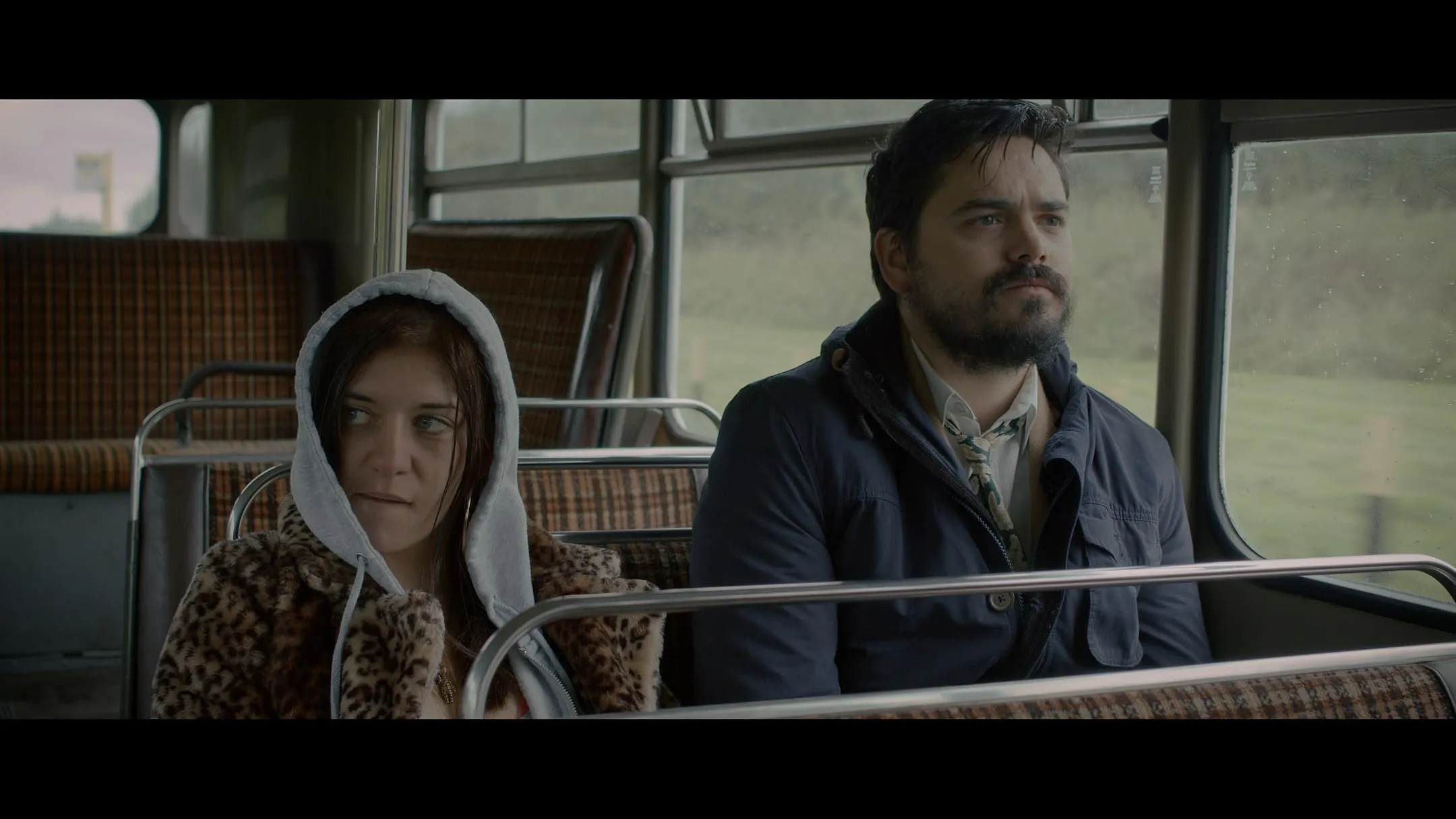A Light Through Coloured Glass arrives as a quiet but potent British drama, one that begins with a scenario familiar to anyone who appreciates the country’s cinematic tradition of realism. We meet William, a man whose life is built on structured belief.
Played by Kyle Brookes, he is a church organist and the host of a local television show about faith, yet his own world is cracking apart now that his wife has left him. Then there is Tina, brought to life with a frantic energy by Sophia Leanne Kelly. She is a young woman caught in a spin cycle of bad luck and worse choices.
Their worlds collide in the most mundane of settings: a corner store. An argument over credit for milk and cigarettes leads to William stepping in to pay the small sum. Tina, proud and insistent, demands to repay him, dragging him into her chaotic orbit where he quickly discovers her initial story about a baby was a lie. This single, tense interaction perfectly establishes the film’s central conflict between two people from entirely different walks of life.
The Soulful Odd Couple
The film builds its foundation on the relationship that grows between William and Tina. It’s a dynamic that reminds me of classic platonic pairings from television like Love, Sydney, where the connection is based on necessity and a shared, unspoken need for companionship.
William’s life of faith and middle-class stability is a world away from Tina’s existence, which is populated by a rough crowd and shadowed by her parents’ history of addiction. Yet the script smartly reveals the fractures in William’s supposedly perfect life; he is just as lost as she is, albeit in a quieter way.
When threats from a local drug dealer force Tina to seek refuge, William cautiously invites her into his home. What follows is a slow, careful study of two people learning to see past their assumptions. We learn of Tina’s forgotten dreams of musical theater, a small detail that adds depth to her character.
The performances from Brookes and Kelly are the film’s anchor. They create a believable, soulful bond that sidesteps romance in favor of something more complex and authentic, finding light touches of humor as they navigate each other’s worlds.
Sidestepping the Saviour
What makes the film so sharp is its refusal to follow a predictable path. I went in wary of a story about a well-off religious man “saving” a downtrodden young woman, but writer-director Mike Clarke cleverly subverts that entire narrative.
The story directly questions the very nature of altruism. When William learns Tina deceived him at the store, his charitable impulse curdles into anger, forcing us to ask why we help others and if we believe some people are more deserving of aid than others.
The script gives Tina the awareness to voice this, as she confronts William about being his “pity project.” The film treats these uncomfortable emotions with a refreshing directness. The stakes are raised by the genuinely menacing performance of Macaulay Cooper as the drug dealer Dan, whose presence adds a shot of raw peril.
The film’s most intelligent choice is how it handles Tina’s transformation. Her ultimate success at turning her life around happens during an eight-month time jump, a decision that places her own agency at the center of her story. William was a catalyst, not her rescuer.
Grit, Grace, and Zero Monies
The story behind the film’s creation is almost as remarkable as the one on screen. This is a “no-budget” feature, filmed during the immense challenges of the pandemic. This fact makes the final product a stunning achievement.
Mike Clarke’s direction is confident and clear, proving that a powerful story doesn’t need a massive budget. The technical aspects are superb for any production, let alone one with such limited resources. The cinematography by Henry Owen captures the mood of gritty British life without overstating the drama, and the original music from Nicolas Iaconis IV complements the emotional tone perfectly.
Iain Cash’s editing is crisp and serves the narrative without flaw. The film is steeped in the aesthetic of British realism, full of locations that feel lived-in and genuine. But where some films in this style can feel relentlessly bleak, this one maintains a current of hope. It demonstrates that independent cinema, born from passion and resourcefulness, can produce work with a heart that many larger studio pictures lack.
The film premiered in 2022 and has been recognized in various film festivals, earning accolades for its storytelling and performances.
Full Credits
Director: Mike Clarke
Writer: Mike Clarke
Producers: Mike Clarke
Executive Producers: Matthew George Walsh
Cast: Kyle Brookes (William), Sophia Leanne Kelly (Tina), Danni Shepherd (Lisa), Macaulay Cooper (Dan), Helen Kent (Brenda), Phil Gwilliam (Alan), Michelle Monk (Sharon), Emily Rose Holt (Carly), Keith Hyland (Mr. Whittaker), Amelia Slater (Receptionist), Mark Tommo (Jack), Matthew George Walsh (Davey), Patrick O’Neill (Carly’s Brother), John Alan Roberts (Doctor Smith), Tina Louise Owens (Nurse), Ruth Murray (Sandra), Anthony St Clair Cadogan (Damien), Jo Dennis (Dancer), Gareth Halliwell (Bar Customer), Stephanie Amy Hindle (Dancer)
Director of Photography (Cinematographer): Henry Owen
Editor: Iain Cash
Composer: Nicolás Iaconis IV
The Review
A Light Through Coloured Glass
A Light Through Coloured Glass is a remarkable piece of independent filmmaking. It succeeds by taking a familiar "odd couple" premise and elevating it with a script that smartly examines the complexities of kindness. Anchored by two deeply authentic lead performances and impressive direction that defies its "no-budget" origins, the film is a moving and intelligent drama. It offers a hopeful, yet realistic, vision of human connection that resonates long after the credits roll.
PROS
- Superb and nuanced performances from the two lead actors.
- An intelligent script that thoughtfully subverts the "saviour" narrative.
- Impressive technical execution for a no-budget production.
- Creates an authentic and humane version of British realism.
CONS
- The deliberate, slow-burn pacing might not appeal to all viewers.
- Its gritty subject matter can be intense at times.
